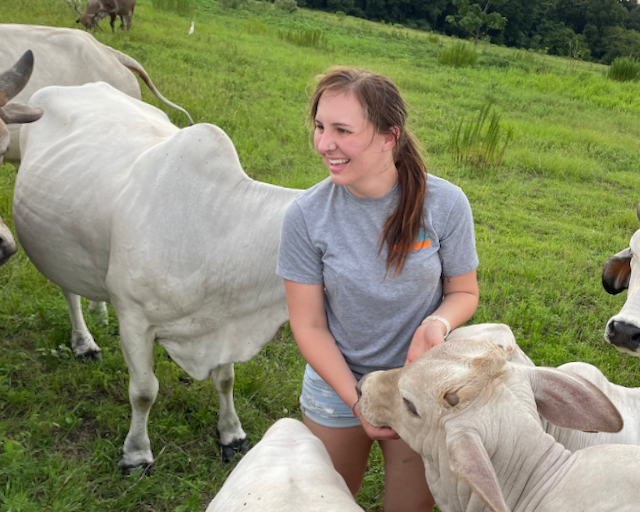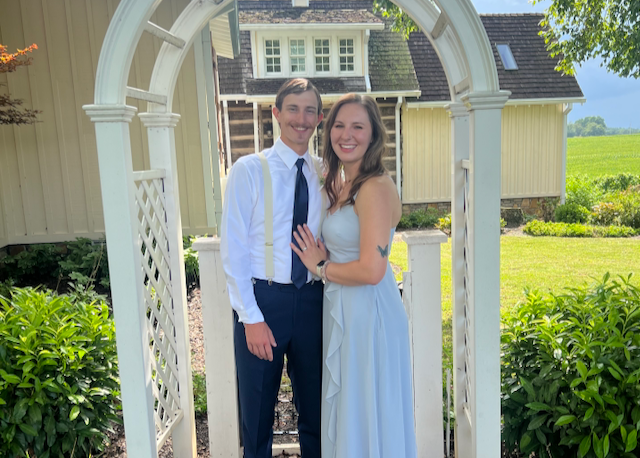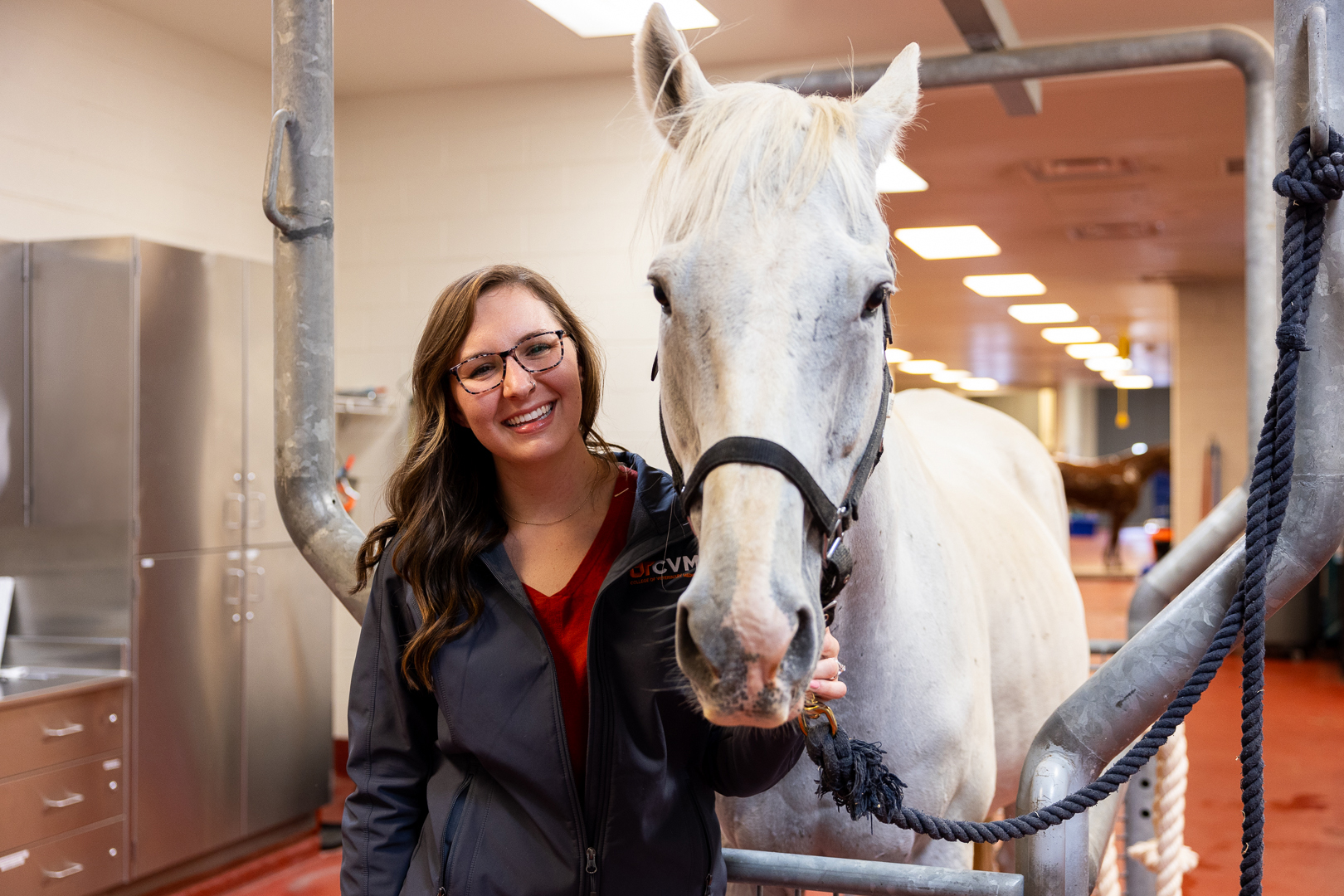
Aspiring large animal veterinarian dedicated to serving rural communities gains leadership and clinical skills at UTCVM
Where are you from, and why did you decide to pursue a Doctor of Veterinary Medicine degree at the University of Tennessee College of Veterinary Medicine (UTCVM)?
I am originally from Brevard, North Carolina, where I spent the first 18 years of my life with my parents and younger brother. I was accepted to the University of Tennessee in 2018 as an undergraduate student where I spent 4 years completing my bachelor’s degree in animal science with a pre-veterinary concentration. Afterwards, I was accepted to UTCVM in 2022 and am currently a third-year clinical student. Being a part of the UT family already was a key factor in my decision to pursue a DVM at UTCVM. I felt at home and all my mentors were either faculty at the Herbert College of Agriculture or at the veterinary college.
To me, leaving behind an established network of mentors, friends, and colleagues was out of the question. Those individuals helped shape me not only into an acceptable applicant, but they truly poured their time, effort, and resources into ensuring I would become an excellent doctor. Their dedication to my continued success proved to me that the University of Tennessee College of Veterinary Medicine was in the business of molding their students into not just successful exam takers, but into veterinarians who dedicated their lives to helping their patients as well as one another. I was more than just a number or a new face they saw in passing. I was known by name, seen for who I am as a unique individual, and valued for what I brought to the team. That mentality and atmosphere is why I decided to pursue a DVM here and why I encourage others to do the same.
Can you describe a typical day in your life as a student at UTCVM?
A typical day as a veterinary student at UTCVM really depends on what year you are in. First year students are gently introduced into the program with fewer classes and shorter days thus allowing the opportunity to get to know campus, establish a study schedule, and explore Knoxville. As we advance into the program, the class load becomes a little heavier and we are usually on campus from 8am to 5pm either in lectures or labs. Not every day is an 8-5 day, which is really nice as it allows time to take a break and either catch up on studies or spend some well-deserved time off. Once we get into the second half of our third year, we are considered clinical students and transition into working in the hospital as “mini doctors”. We see a variety of different cases and rotate every 2 weeks onto a different service to allow us the opportunity to see as many aspects as possible of veterinary medicine in practice before we graduate and begin working in the real world.
What has been your most memorable or rewarding experience at UTCVM so far?
My most memorable and rewarding experience at UTCVM would be performing my first live animal surgery with Dr. Mulon in the Large Animal Surgery elective. We were assigned a patient (a Holstein cow) and my colleague and I were expected to perform the surgery from start to finish on our own accord while being observed by our surgical clinician. It was the first time I had ever created my own surgical plan and executed it myself instead of simply observing or assisting.
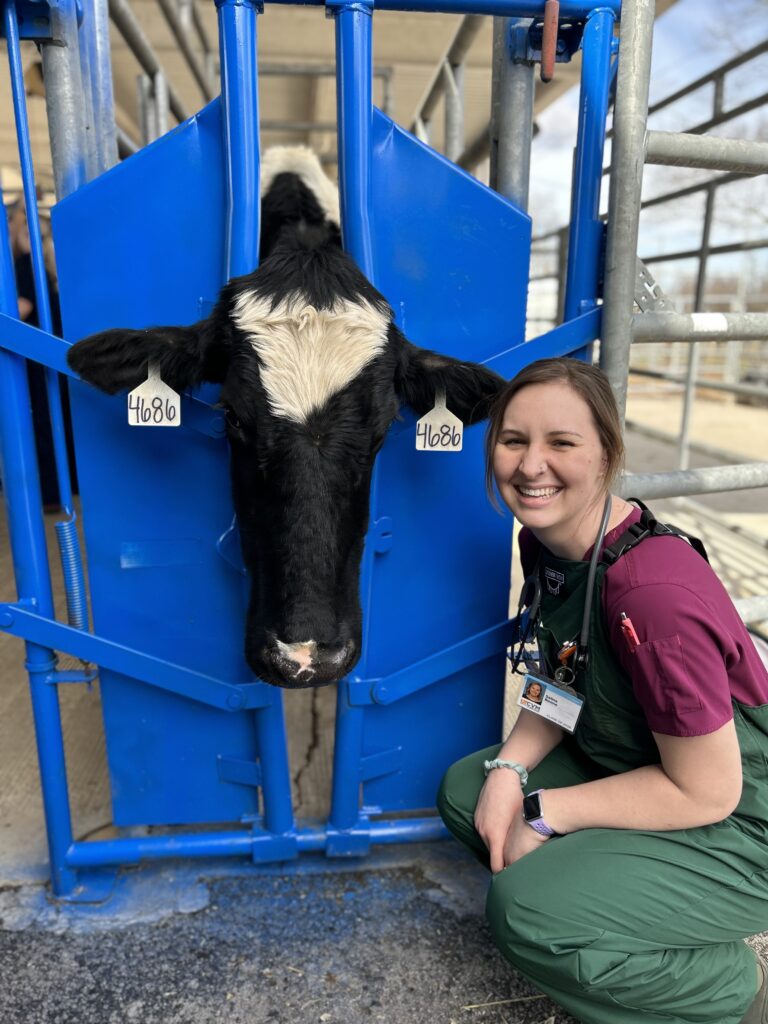
When problems arose, I got to call the shots and mitigate those issues with the skillset and knowledge I had gained in my time spent in the classroom. It was a very validating experience and instilled in me the confidence I needed to know that I was capable and deserving of being in this field of work. Likewise, I got to watch my colleague, a dear friend of mine from undergrad, step into her own role as a doctor and gain the same confidence I found in myself during that experience. Having that moment of realization of “Woah… I actually can do this!” with her, after years spent working to get to exactly that point, is a memory I will always be grateful for. I know we will both look back fondly on that day as we advance in our clinical years post-graduation.
What is your favorite subject to learn about in vet school, and who is a professor who has made a significant impact on your learning experience?
I actually have two subjects tied for my top favorites and they would be reproduction/theriogenology and cardiology. I knew reproduction would be one of my favorite things to learn about because it was the subject in undergrad I fell in love with and took every opportunity I could to learn more about it. At one point I had considered becoming a board-certified theriogenologist because of how much I enjoyed the subject! My friends even lovingly call me the “Repro Queen” because they know how obsessed I am about every aspect of reproduction, including the genetic and physiologic aspects of the subject. Cardiology actually took me by surprise when it jumped to the top of my list of favorite subjects because I had never really grasped the cardiovascular system in undergrad and was worried I would struggle in vet school with it as well. However, I quickly learned how fascinating the heart is as well as how even the smallest of changes can cause huge system-wide impacts on our patients.
Narrowing down the professor who has made a significant impact on my learning experience is difficult as there is a plethora of individuals here at UTCVM who have personally impacted me in various ways. If I had to choose, I would say it is between Dr. Pierre-Yves Mulon and Dr. Andrea Lear. Dr. Mulon became a mentor for me in my second year of the program and has helped me write a case report that I have presented at the American Association of Bovine Practitioners conference and recently presented at another local conference. I have learned from him the value of slowing down, looking at each case from different angles, and not being afraid to think outside of the box to come up with the best solution for the patient and client.
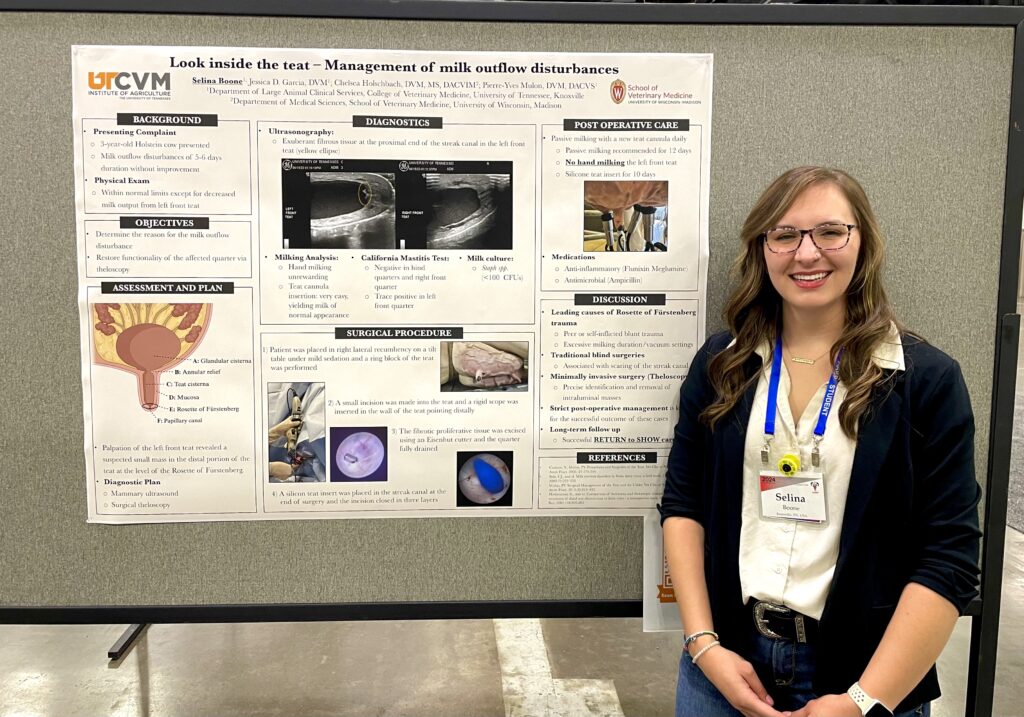
Dr. Lear is a field service veterinarian and someone I look up to as an aspiring field service vet. Her classroom material is presented to us in a format that is digestible and applicable while still ensuring we are given thorough information to best serve our patients. She is witty, hilarious, and relatable to us as students. There is never a time she isn’t smiling or cracking a joke! I have come to her many times for advice, and she always makes time for me, even when she is busy. She reminds me of the importance of a good work/life balance, and that you can love what you do and be happy doing it.
Can you describe any out-of-the-classroom learning opportunities you’ve had during your time as a veterinary student and the impact they had on your education?
I was offered a position on the Large Animal Emergency and Critical Care team at the beginning of my second year which has been the biggest out-of-the-classroom learning opportunity I have been presented thus far in my education. As a member of this team, I have worked closely with the large animal emergency team of clinicians, technicians, vet assistants, and students advancing not only my physical clinical skills, but also my time management skills, client communication skills, and teamwork abilities. Each night presented a new opportunity to ask questions, research diseases and treatments I was unfamiliar with, and work with my team to provide the best care possible for each patient in hospital. I have been able to place jugular catheters, draw blood, calculate fluid rates, prep patients for surgery, triage incoming emergencies, take radiographs, observe and assist emergency surgeries, assist with dystocias, care for neurologic patients, and so many other things it would take pages to list.
Being a part of this team impacted my education by giving me the chance to apply my knowledge in a safe space with a team of incredible people who wanted to see me grow as a future doctor. It reminded me on the hard days why I chose this career path and how fulfilling it is to be able to be a voice for our patients in times of distress. It also reinforced the importance of our support staff (technicians and vet assistants) and that without them, we would not be able to do all that we do for our patients. I was able to learn from multiple doctors and technicians in my time on the team and to take away something from each of them to implement in my future patient care. There will never be enough words to describe my gratitude to each individual who answered my never-ending questions and worked patiently with me as I advanced in my skillset and knowledge base. They are the reason I fell in love with emergency medicine and continue to strive each day to become a better doctor.
As a member of the Large Animal Emergency and Critical Care team, what are some memorable cases that have shaped your learning experience?
The first case to come to mind is when I was able to assist in a goat c-section. I had never seen one before and was excited to be in the room watching it take place. Remember, I am obsessed with all aspects of reproduction, so to see a c-section for the first time was unforgettable. The clinicians knew how excited I was and talked me through everything they were doing, even down to the type of suture they used and why. Seeing both baby goats come out alive and healthy was a huge success. I remember watching them get up for the first time and in the following days watched them navigate the world as the curious creatures they are. Even though the surgery took place in the early hours of a Sunday morning, it was worth the lack of sleep to see such an incredible moment.
Another case that sticks with me is when we had a mare who foaled unexpectedly. She was in our isolation ward and on foal watch but wasn’t due for at least another week. My boss and I were all the way in farm animal getting medications together for another patient when she got the call that there was a foal on the ground. She took off sprinting through the hospital yelling “FOAL ON THE GROUND! ALL HANDS ON DECK!” and I was right on her heels. Of course, nothing was ready in the stall because we were not expecting a baby so soon, so my fellow teammates and I got together, made a list of what was needed, and split off to sprint around the hospital gathering supplies to take back to isolation while the clinician and technicians worked on the mare and foal. It was the perfect example of fully trusting your entire team to step up to the plate and take care of what was needed. The foal ended up making it and I spent the rest of the night sitting with him giving him fluids, checking his vitals, and giving medications when indicated. Both experiences highlighted the level of teamwork that is vital to the success in excellent patient care. We knew what was expected of ourselves and each other, and everyone willingly worked together for the same outcome.
What do you think makes UTCVM stand out from other veterinary programs?
I think the biggest thing that stands out, besides the other qualities I have listed already, is the fact we have a 3-semester-long clinical portion of our program. While it does make the first 5 semesters a little more rigorous, having around 16 months straight of clinical hands-on experience (compared to 12 months in most programs) has been pivotal to my education. I am a heavy hands-on learner and applying the knowledge from the didactic (classroom) portion of the program now in a clinical teaching setting is solidifying topics I was beforehand a little “shaky” on or didn’t have a full grasp on the details needed for clinical practice. It has also reminded me that I am capable of being in this career field and that all my hard work and long hours studying will pay off each case I see on every rotation I take.
What advice would you give to veterinary students who are interested in specializing in large animal medicine or taking on leadership roles during their studies?
If you can, start now. Especially in terms of interest in large animal medicine. Get to know how agriculture works in your community. Go to Cattlemen’s Association meetings, FFA meetings, 4-H shows, and livestock sales. Talk to the farmers around you and gain an appreciation for all they contribute to the agriculture industry so when you come to their farms to practice medicine, you not only have a deep rooted level of respect for the work they do, but you also have a genuine understanding of what role you play in their overall heard health and maintenance.
As far as leadership roles go, learn how you best lead. Are you an “all-hands-on-deck” kind of person or a “words of affirmation” leader? You can be a combination of many things but learning how you lead will allow you to be comfortable managing conflicts, making difficult decisions, and delegating tasks to your team members. Also remember not to take on too much. Take it from someone who does that on a daily basis, you will get burnt out quickly and that snowballs into many other negative things. Set a baseline for what your level of contribution will be and don’t exceed that (unless truly necessary) level. Delegate tasks to your team and communicate about expectations. Your studies should ALWAYS take priority to your leadership roles.
Looking ahead, what are your professional aspirations in veterinary medicine, and how do you envision your future career impacting the field of large animal health?
My professional aspirations really have not changed much since I applied, they have simply become more expansive and detailed. I want to be a large animal mobile/field service veterinarian. I would like to work with both farm animals and equine in a general practice mobile setting while occasionally seeing emergency patients after hours. In doing so, I envision my future career impacting the field of large animal health by targeting rural areas to service in order to provide affordable, reliable, and good quality veterinary care. Coming from an area that is considered rural and only has a handful of large animal veterinarians available at any given time, I knew going into vet school that I would come back to my roots and serve the rural community I end up in after completing my DVM. Ideally, I would like to work under a mentor and establish a stronger baseline of confidence and skillset before I head out to start my own business.
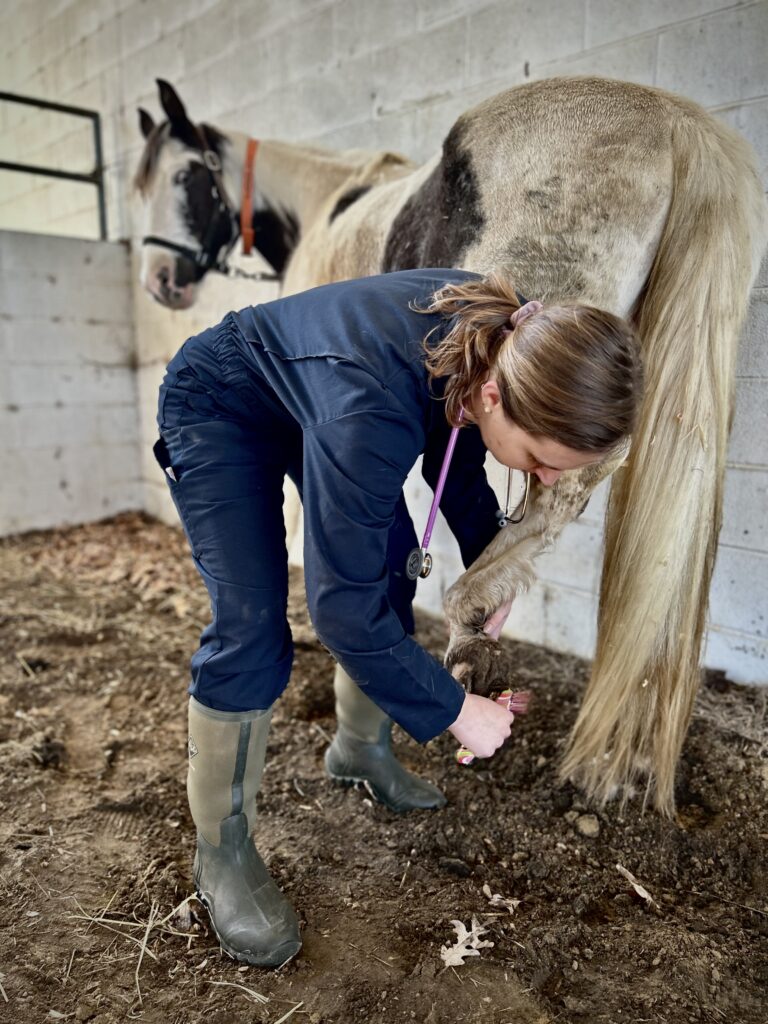
What do you like to do outside of school and/or what is a fun fact about yourself that your fellow students and professors may not know?
I am a HUGE K-pop fan, specifically BTS, and I really enjoy attending concerts during my free time. I have seen BTS once in concert and have seen one of their members as well on his solo tour. One solo artist named Eric Nam sang happy birthday to me on stage for my 22nd birthday and I went back a couple years later to see him live again. I’ve also seen BM from KARD and will hopefully be seeing BTS again come end of 2025/beginning of 2026 if they go on tour! When I have time during the week, I love to dance Argentine Tango and Contra. I have been dancing Argentine Tango for about 4 years now and will actually be traveling to Argentina in June 2025 for a rural veterinary medicine rotation! Other than that, I usually just like to read, binge watch shows with my husband, or play with our dogs, cat and rabbit. Recently I started my own sourdough starter… we will see how that goes haha!
